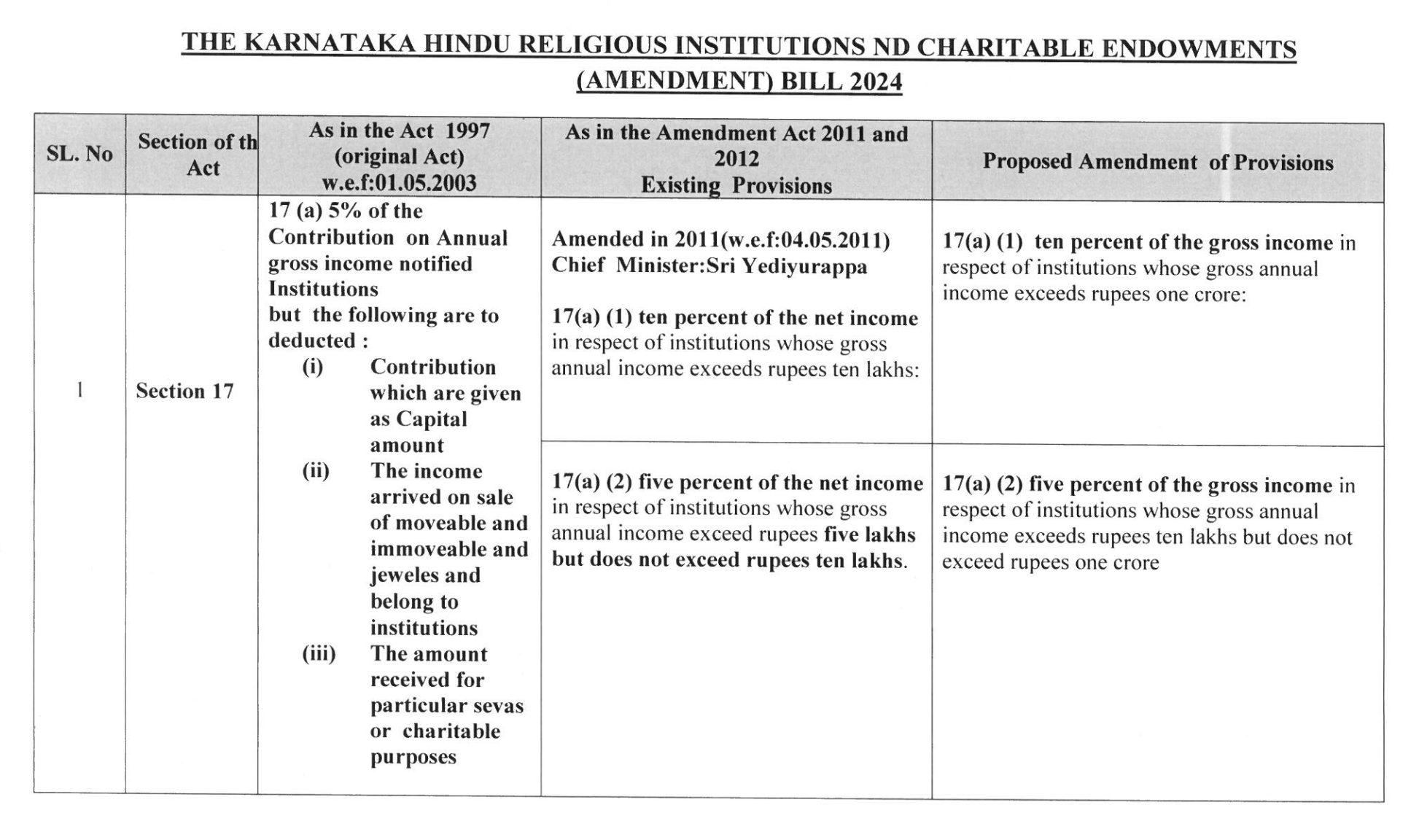Karnataka's Temple Tax Legislation: Examining Claims, Counterclaims, and the Facts
The Karnataka Hindu Religious Institutions and Charitable Endowments Act, 1997, is legislation enacted by the state government of Karnataka to regulate and manage Hindu religious institutions and charitable endowments within the state. The primary objective of this act is to ensure proper administration, governance, and utilization of funds and assets associated with Hindu temples, mutts, and religious trusts.
Key provisions of the Karnataka Hindu Religious Institutions and Charitable Endowments Act include:
1. Registration of Institutions: The act mandates the registration of Hindu religious institutions, including temples, mutts, and trusts, with the state government. Institutions must comply with the rules and regulations prescribed by the authorities.
2. Appointment of Trustees: The act specifies the process for appointing trustees to manage the affairs of registered institutions. Trustees are responsible for overseeing the administration, finances, and activities of the institution.
3. Administration of Funds and Assets: The act regulates the management of funds, properties, and assets belonging to registered institutions. It outlines guidelines for the utilization of income generated from endowments, donations, and offerings.
4. Maintenance of Accounts: Registered institutions are required to maintain accurate accounts and records of their financial transactions, including income, expenditure, and assets. They must submit annual reports and financial statements to the authorities for review and audit.
5. Protection of Endowments: The act aims to safeguard the interests of donors and devotees by ensuring that endowments and offerings made to religious institutions are used for the intended purposes. Any misappropriation or misuse of endowment funds is strictly prohibited.
6. Regulation of Religious Practices: While respecting the religious customs and traditions of Hindu institutions, the act empowers the government to regulate certain practices to prevent exploitation, discrimination, or abuse of devotees.
7. Appointment of Executive Officers: The state government may appoint executive officers or administrators to oversee the day-to-day operations of registered institutions. These officers are responsible for implementing government policies and directives.
8. Dispute Resolution: The act provides mechanisms for resolving disputes related to the administration, management, or ownership of religious institutions and endowments. Disputes may be adjudicated by the authorities or referred to civil courts for resolution.
The Karnataka Hindu Religious Institutions and Charitable Endowments (Amendment) Bill, 2011
The Karnataka Hindu Religious Institutions and Charitable Endowments Amendment Bill 2011 proposed changes to enhance transparency, streamline administration, and ensure better management of temple trusts and assets. It sought to address issues related to governance, financial management, and accountability within these institutions. Additionally, the bill aimed to strengthen the regulation of temple properties and endowments to prevent misuse and promote the effective utilization of resources for religious, charitable, and welfare purposes. The legislative amendments were intended to modernize and improve the functioning of these institutions.
The Karnataka Hindu Religious Institutions and Charitable Endowments (Amendment) Bill, 2024
The Purpose of the Amendment
The core purpose behind the proposed amendment was twofold. Firstly, it aimed to create a more robust support mechanism for ‘C’ category Hindu temples, which represent the smaller, often rural, temples struggling with financial constraints. Unlike their wealthier counterparts, these temples face significant challenges in maintenance and conducting regular religious services due to limited income streams. Secondly, the amendment sought to enhance the welfare of priests serving in these temples by ensuring a more equitable distribution of resources. By proposing a redistribution of income from wealthier temples, the government intended to establish a financial lifeline for the less fortunate temples, thereby fostering a more unified and supportive Hindu religious community in Karnataka.
Key Provisions in the Amendment
At the heart
of the Karnataka Hindu Religious Institutions and Charitable Endowments
(Amendment) Bill, 2024, were several key provisions aimed at restructuring the
economic framework within which Hindu temples in Karnataka operate. The
amendment proposed the collection of a specified percentage of income from
temples with annual earnings exceeding Rs 10 lakh. This collected amount would
then be funneled into a Common Pool Fund, designed to serve multiple purposes -
from maintenance and renovation of ‘C’ category temples to providing financial
assistance and scholarships to priests and temple staff.
What is the Common Pool Fund?
The Common Pool Fund is extensively outlined in Chapter 4 of
the Hindu Religious Institutions and Charitable Endowments Act, 1997. The State
Dharmarika Parishad is authorized to establish a common pool fund. This fund
collects a portion of the revenue from major temples and state government
grants to support the upkeep of smaller and financially challenged Hindu
temples and religious institutions under the Muzrai department. Grants are
allocated for various purposes such as establishing Hindu orphanages,
constructing cowsheds, and promoting the study of Hinduism, among others.
Another
significant provision within the amendment was the establishment of clear
guidelines for the allocation of funds from this Common Pool. It emphasized
that the usage of funds must be strictly limited to Hindu religious purposes,
addressing concerns about potential misuse for non-religious activities. This
specification was a response to opposition allegations and sought to clarify
the government’s stance on maintaining religious sanctity and purpose in the
distribution of temple revenues.
By
introducing these provisions, the Karnataka Hindu Religious Institutions and
Charitable Endowments (Amendment) Bill, 2024, aimed to bring about a more
equitable system of financial support within the Hindu religious community in
the state, ensuring that all temples, regardless of their income, could fulfill
their religious and cultural responsibilities.
Arguments Against the Amendment
Opponents of
the amendment argued that allocating a percentage of income from wealthier
temples to a Common Pool Fund would undermine the financial autonomy of these
institutions. They expressed fears that the redistribution could lead to
government overreach and misuse of funds intended for religious purposes.
Moreover, detractors highlighted that temples, as entities deeply rooted in
faith and community, should not be treated as mere revenue sources. The
significant resistance in the Legislative Council, where the proposed
amendments were ultimately rejected in a voice vote, underscores the divisive
nature of the bill and the complexities involved in managing religious
endowments.
Potential Outcomes for Religious Institutions
One of the
core objectives of the amendment bill is to ensure a more equitable
distribution of resources across Hindu temples, particularly benefiting those
in the ‘C’ category who are less financially endowed. If successfully
implemented, this could mean an upliftment in the maintenance and activities of
smaller temples, potentially increasing their relevance and attendance within
their communities. Such a shift not only promises better facilities and more
robust religious programs but could also strengthen community ties and
reinforce the importance of lesser-known temples in Karnataka’s cultural and
spiritual landscape.
Additionally,
the focus on priests’ welfare and temple upkeep through the generation of a
Common Pool Fund might lead to a heightened sense of security among temple
caretakers and priests. This, in turn, could attract more individuals to take
on these roles, knowing that there is a systemic support network backing their
welfare and that of the temples they serve.
The Road Ahead for the Amendment Bill
The future
of the amendment bill seems uncertain after facing challenges in the
Legislative Council but passing in the Legislative Assembly. Opposition from
parties like BJP and JD(S) due to concerns about religious tensions and fund
misuse highlights the need for careful discussion and possibly changing some
parts of the bill. The bill's fate might depend on the results of the upcoming
Lok Sabha elections, which could change how the law is handled. Involving
temple authorities, priests, and community members could help find common
ground or adjust the bill to address concerns. The decisions made in the next
few months could influence how similar laws are handled not just in Karnataka,
but in other states too.
Future Implications and Conclusion
The
Karnataka Hindu Religious Institutions and Charitable Endowments (Amendment)
Bill, 2024, has stirred a notable controversy, not just for its immediate
impact but also for the potential long-term effects it could have on religious
institutions and the socio-political landscape of Karnataka. This piece delves
into the future implications of the amendment, offers insights into what lies
ahead for the proposed legislation, and provides some final thoughts on the
matter.




Comments
Post a Comment